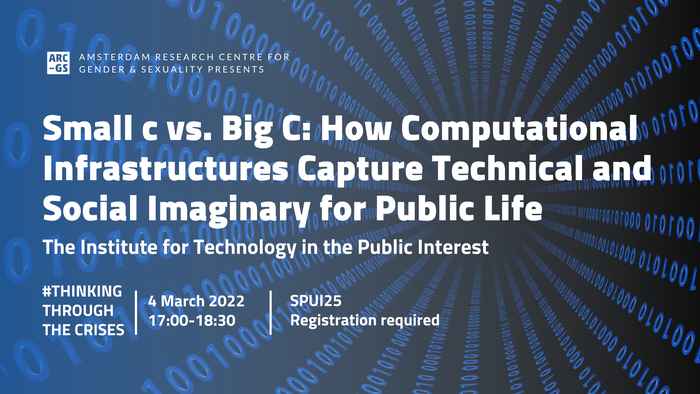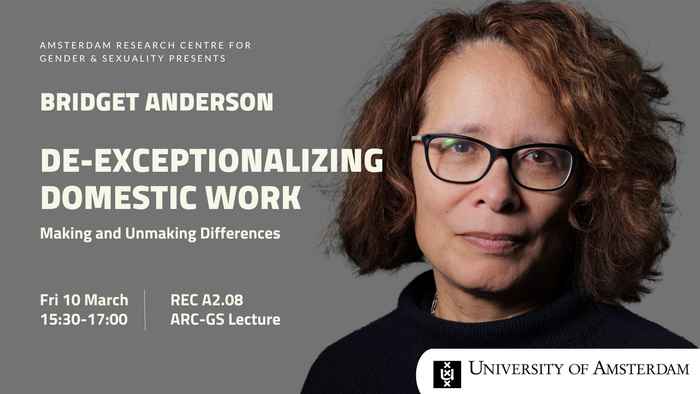Seminar Series
-
Research in Focus #1 | A Queer New York: Geographies of lesbians, dykes, and queers, 1983-2008 | Jack Gieseking
Research in Focus #1 | A Queer New York: Geographies of lesbians, dykes, and queers, 1983-2008 | Jack Gieseking
The path to lesbian, gay, bisexual, transgender, and queer (LGBTQ) liberation has been narrated through a claim to long-term territory in the form of urban neighborhoods and bars. Lesbians and queers fail to attain or retain these spaces over generations—as is often the case due to lesser political and economic power—so what then is the lesbian-queer production of urban space in their own words?
- Speakers: Jack Gieseking, Ladan Rahbari and Andrew DJ Shield
- Date: 12 November 2020
-
Research in Focus #2 | The child, true gender self and the clinic | Sahar Sadjadi
Research in Focus #2 | The child, true gender self and the clinic
In recent years, the field of clinical management of gender in children has expanded and new approaches to gender variant children have emerged. In this webinar, Sahar Sadjadi traces the shifts and continuities in the clinical paradigm that has shaped diagnostic and treatment practices around gender variant children in the early 21st century.
- Speaker: Sahar Sadjadi, Geertje Mak
- Date: 10 December 2020
-
Research in Focus #3 | Disobedient Black Mothers: The culpable sufferer, the criminal dead, and the intolerability of refusal | Jan-Therese Mendes
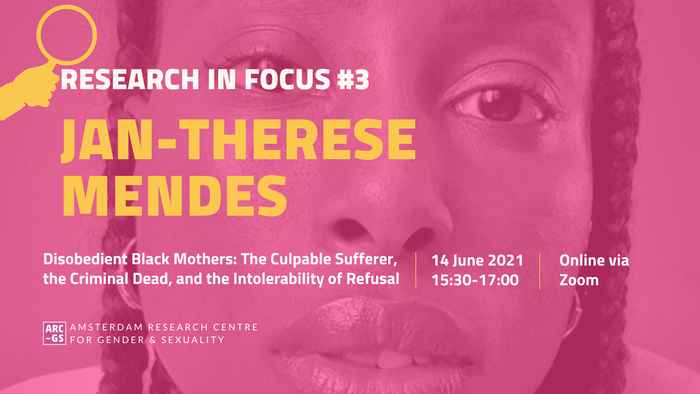 Disobedient Black Mothers: The culpable sufferer, the criminal dead, and the intolerability of refusal
Disobedient Black Mothers: The culpable sufferer, the criminal dead, and the intolerability of refusalDrawing feminist analyses of the affective work of shame, compassion, and pain into dialogue with an Afro-pessimist critique of the ‘ordinary’ spectacle of Black suffering and death, this lecture theoretically examines how the ‘bad feelings’ that stick to Black women’s disobedient bodies are used to uphold the whiteness of public space. Considering mainstream news media and social media coverage of two separate instances from 2019 where Black mothers were subjected to public violation or public scorn — in accordance with racial-sexual logics that define the Black female body as recalcitrant, ungovernable, and disposable — I argue that the fleeting shame or sustained apathy of a looking public reveals how the theatre of Black distress renews the racial fraternities of the white city-nation. Situating this analysis within the intellectual tradition of Black feminist thought and praxis this lecture further interrogates the ways women refuse these capitalisations through mutinous affects that illicitly reproduce Black life or embrace death.
About the Speaker
Jan-Therese Mendes holds a PhD in Social and Political Thought from York University, Canada. Mendes is currently a postdoctoral fellow in studies of gender and race with the Centre for Gender Studies at the University of Stavanger and a 2020-2021 visiting scholar with the Amsterdam Research Centre for Gender and Sexuality. Mendes has previously held visiting scholar positions at Uppsala University’s ‘Centre for Multidisciplinary Studies on Racism’ (2018) and in performance studies at Stockholm University (2017), where Mendes has also extensively guest lectured. Invoking frames of analyses from Black feminist theory, Afro-pessimism, and affect theory Mendes’ research uses critical media analyses and arts-based methods to examine Northern welfare states’ penal fixation on the Black womb, Black mournability, pedagogies of assimilation and humiliation, and the possibilities of willful strangeness in Black visual and performance art. Mendes’ recent or forthcoming works are published with Souls, Hypatia, Periskop, and the Palgrave Handbook of Queer and Trans Feminisms in Contemporary Performance. At the start of the COVID-19 pandemic Mendes founded the international collective ‘Black Feminist Fridays: Nordic and Beyond’ which brings together scholars, artists, and activists from across Scandinavia for bi-weekly online dialogues on the everyday pain, love, and imagination of living Black feminist lives.
-
Research in Focus #4 |The queer politics of postcoloniality | Rahul Rao
Research in Focus #4 |The queer politics of postcoloniality
Between 2009 and 2014, an anti-homosexuality law circulating in the Ugandan parliament came to be the focus of a global conversation about queer rights. Focusing on the Ugandan case, political theorist Rahul Rao traces the encounters and entanglements across geopolitical divides that produce and contest contemporary queerphobias. Rao’s book, "Out of Time: The Queer Politics of Postcoloniality" (2020), investigates the impact and memory of the colonial encounter on the politics of sexuality, the politics of religiosity of different Christian denominations, and the political economy of contemporary homophobic moral panics.
- Speaker: Rahul Rao
- Date: 15 October 2022
-
Research in Focus #5 | "Feminine happiness": Sexuality and disability in Kyrgyzstan | Mohira Suyarkulova
Research in Focus #5 | "Feminine happiness": Sexuality and disability in Kyrgyzstan | Mohira Suyarkulova
Happiness and its pursuit have become the new normative regime, a teleological end-all of human existence in a neo-liberal society. The various critics of this condition have pointed out that the ideology of personal happiness and the “happiness industry” it has generated are utilised by capitalist regimes to appease individuals with the condition of the ever-growing social wretchedness.
- Speaker: Mohira Suyarkulova, Rahil Roodsaz, Julie McBrien (moderator)
- Date: 26 November 2021
-
Research in Focus #6 | The Flexibility Paradox | Heejung Chung
Research in Focus #6 | The Flexibility Paradox | Heejung Chung
Why flexible working is not a magic bullet for enhancing gender equality
Research in Focus #6 | Heejung Chung | 25 March 2022 | 15.30-17.00 | Online event
Does flexible working really provide a better work-life balance, enhance worker’s well-being and gender equality? Using data from across Europe and drawing from studies across the world, Chung will evidence how flexible working can lead to workers working longer and harder, with work encroaching on family life.
-
Research in Focus #7 |Same-Sex Intimacy, Gender, and Identity in Postcolonial Ghana | Serena Dankwa
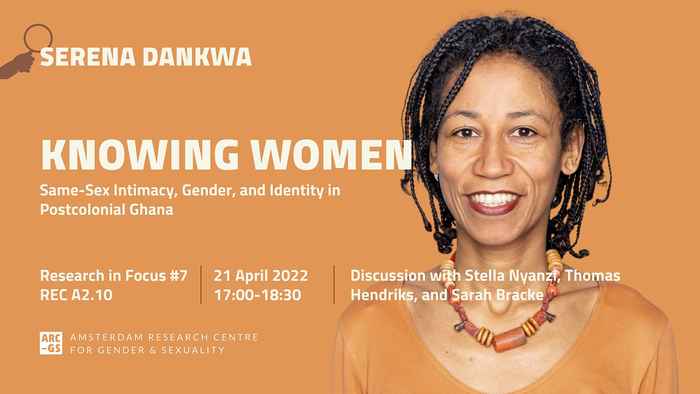 Research in Focus #7 |Same-Sex Intimacy, Gender, and Identity in Postcolonial Ghana | Serena Dankwa
Research in Focus #7 |Same-Sex Intimacy, Gender, and Identity in Postcolonial Ghana | Serena DankwaSame-Sex Intimacy, Gender, and Identity in Postcolonial Ghana
This session of Research in Focus series is dedicated to the book Knowing Women, an ethnography on friendship, desire, and same-sex intimacy among urban, working-class women in southern Ghana. The intersectional analysis of their life narratives situates these women in relation to political, economic, and social developments affecting Ghana and other postcolonial and African countries, including anti-gay policies and queer activist movements.
- Speaker: Serena Dankwa
- Date: 21 April 2022
-
Research in Focus #8 | From the closet to the cabinet | Robby Davidson
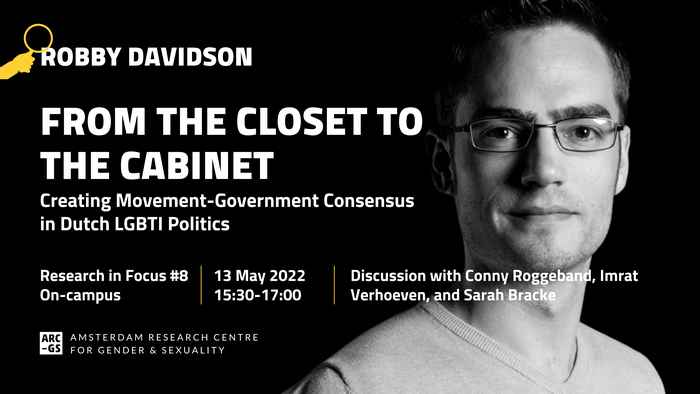 Research in Focus #8 | From the closet to the cabinet | Robby Davidson
Research in Focus #8 | From the closet to the cabinet | Robby DavidsonCreating movement-government consensus in Dutch LGBTI politics
While studies of social movements have overwhelmingly focused on contention and protest, I focus on the other end of the tactical spectrum, consensus. I conceptualize a repertoire of consensus and argue that through deploying a repertoire of consensus, movement actors might be able to establish relations with government actors characterized by cooperation and/or collaboration.
- Speaker: Robby Davidson
- Date: 13 May 2022
-
Research in Focus #9 | Inverting Sex: A History of Gender Transgressions in Early Twentieth-Century Argentina | Patricio Simonetto
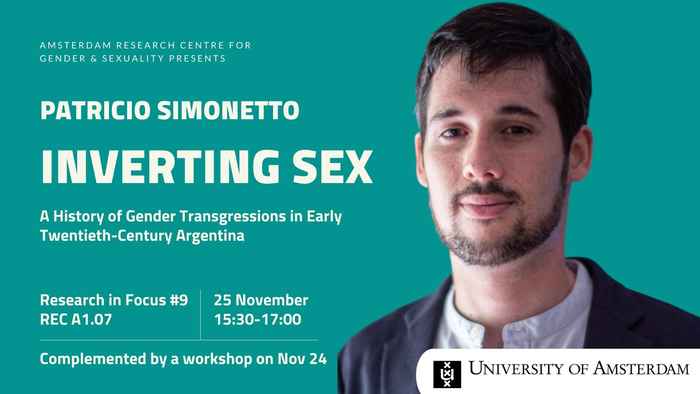 Research in Focus #9 | Inverting Sex: A History of Gender Transgressions in Early Twentieth-Century Argentina | Patricio Simonetto
Research in Focus #9 | Inverting Sex: A History of Gender Transgressions in Early Twentieth-Century Argentina | Patricio SimonettoSpeaker: Patricio Simonetto | Friday 25 November | 15:30-17:00 | REC A1.07
This presentation will explore the social and cultural history of transgressive gender embodiments during the early twentieth century. The lecture will explore the practices and discourses of those who allegedly "changed their sex" before the popularisation of biotechnological treatments.
-
Thinking Through the Crises #1 | What is Essential Work? Social Reproduction in Pandemic Times | Tithi Bhattacharya
What is Essential Work? Social Reproduction in Pandemic Times
The Covid-19 pandemic has sharply clarified what social reproduction feminists have been saying for a while, namely that care work and life-making work are the essential work of society, and that this essential work is deeply gendered and racialized. In this webinar, Tithi Bhattacharya will offer an analysis of current conditions of how work and life are organized and are reshuffled in pandemic times through a lens of social reproduction theory.
- Speakers: Tithi Bhattacharya and Marguerite van den Berg
- Date: 16 September 2020
-
Thinking through the Crises #2 | Special 8th of March Edition | The Women’s Strike
The Women's Strike
What is the international movement called the Women’s Strike? How does it speak to questions of work and care, and violence against women (#NiUnaMenos)? What can the Women’s Strike look like at the university? How could we imagine the Women’s Strike at the University of Amsterdam? We were joined on International Women’s Day for a conversation with Dr. Siggie Vertommen (Ghent University), who joined us from the Women’s Strike at Ghent University; Dr. Maud Bracke (University of Glasgow), who told us more about the history of the Women’s Strike; and Dr. Ladan Rahbari (University of Amsterdam), who brainstormed together with ARC-GS about how a Women’s Strike could look like at the UvA. The conversation was facilitated by Sarah Bracke, Director of ARC-GS.
- Speaker: Siggie Vertommen, Maud Bracke, Ladan Rahbari
- Date: 8 March 2021
-
Thinking through the Crises #3 | Critical Breakdown | María Puig de la Bellacasa
Thinking through the Crises #3 | Critical Breakdown | María Puig de la Bellacasa
Life on Earth depends as much on the build-up and endurance of matter as it is its breakdown and recirculation. Today ecological cycles on Earth are struggling with a crisis of breakdown processes, choking from an excess of manufactured endurance. Engaging with a notion of critical breakdown from an intersectional feminist standpoint in this seminar we will explore what naturecultures grounded on the resistance to breakdown can learn from this ecological crisis.
Speakers: María Puig de la Bellacasa, Francio Guadeloupe
Date: 25 March 2021
-
Thinking through the Crises #4 | Feminist self-defence against Violence. A vital critique of neoliberalism as a regime of death | Elsa Dorlin
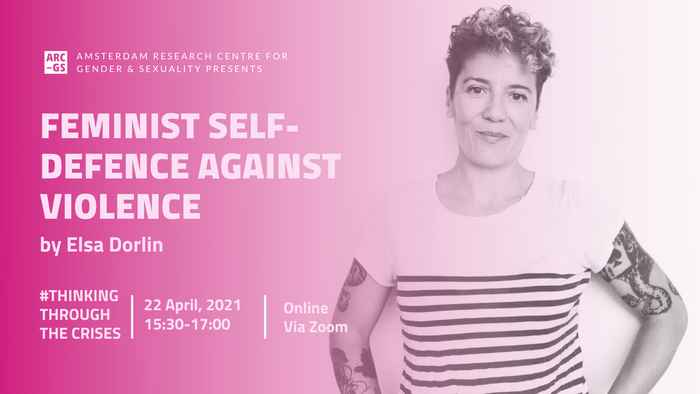
Elsa Dorlin Thinking through the Crises #4 | Feminist self-defence against Violence. A vital critique of neoliberalism as a regime of death | Elsa DorlinThis intervention would like to return to the genealogy of feminist insurrectionary currents that have problematized self-defence as a global politics of struggle against the liberal state and capitalism: self-defence is thought of as the recourse to a power of embodied self-organization, sexual, social, sanitary, intellectual, that generates other modes of collective organization and reproduction of life, and that targets the mortifying dimension of patriarchy proper to hegemonic modernity. In the context of the pandemic, of the unlimited capitalist predation and of the intensification of the neo-colonial police repression within the historical democracies, it will be a question of rethinking the positioning of a part of the feminist movements as revolutionary power.
About the speakers
- Elsa Dorlin is Professor of Social and Political Philosophy at the University of Paris 8 Vincennes/Saint-Denis in France.
- Jan-Therese Mendes is currently a postdoctoral fellow in studies of gender and race with the Centre for Gender Studies at the University of Stavanger and a 2020-2021 visiting scholar with the Amsterdam Research Centre for Gender and Sexuality.
- Polly Pallister-Wilkins is associate professor in international relations and conflict resolution and governance at the UvA.
-
Thinking Through the Crises #5 | Ending Violence Against Women: The Promise and Pitfalls of International Law in Latin America and Europe | Jelke Boesten, Andrea Krizsan, Conny Roggeband, and Lorena Sosa
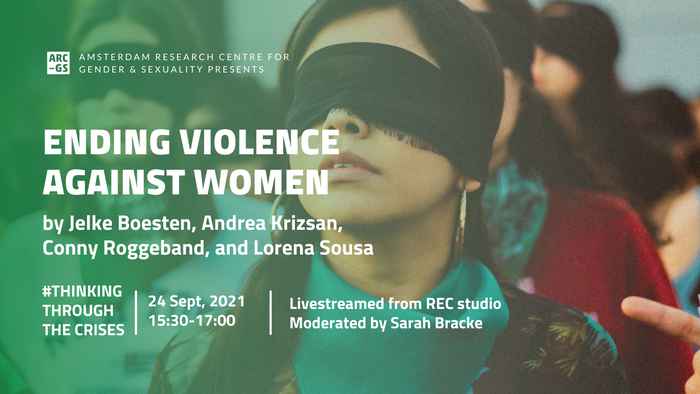 Thinking Through the Crises #5 | Ending Violence Against Women: The Promise and Pitfalls of International Law in Latin America and Europe
Thinking Through the Crises #5 | Ending Violence Against Women: The Promise and Pitfalls of International Law in Latin America and EuropeEliminating violence against women remains one of the key feminist struggles of today. Assaults on women violate human rights, prevent peace, undermine democracy and have a tremendous cost for societies. While feminist advocates successfully turned VAW into a human rights problem and managed to push for national and international policies and legislation, gaining access to justice for acts of gender-based violence remains difficult. In this roundtable we discuss the paradoxes surrounding international law as an instrument bringing gender justice in Europe and Latin America.
Speakers
- Jelke Boesten (King’s College London)
- Andrea Krizsan (CEU Vienna) and Conny Roggeband (UvA)
- Lorena Sosa (Universiteit Utrecht)
-
Thinking Through the Crises #6 | Small c vs. Big C
How computational infrastructures capture technical and social imaginary for public life
4 March 2022 | 17-18.30 hrs | Spui 25
This conversation with The Institute for Technology in The Public Interest (TITiPI) will center on how institutions and the lives they are tasked with supporting, are impacted by Computational Infrastructures.
-
ARC-GS Workshop | New Frontiers in the History of Sexuality | Complement to Patricio
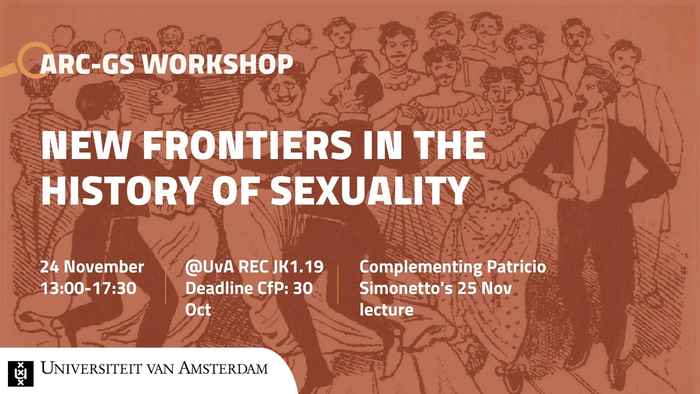 Workshop | Patricio Simonetto | Friday 24 November | 13:00-17:30 | REC JK1.19
Workshop | Patricio Simonetto | Friday 24 November | 13:00-17:30 | REC JK1.19Complementing Patricio Simonetto’s lecture at ARC-GS, “Inverting Sex: A History of Gender Transgressions in Early Twentieth-Century Argentina,” this workshop offers researchers and advanced graduate students a platform to continue the discussion started in Dr. Simonetto’s lecture and to present their own work in progress.
-
ARC-GS Lecture | De-exceptionalizing domestic labour: making and unmaking differences | Bridget Anderson
REC A2.08 |10 March 2023 | 3.30pm-5.00pm | Bridget Anderson
The doing of domestic work reflects, reproduces and entrenches complex inequalities and social hierarchies, effectively making and re-shaping difference across different axes. Research has examined this difference making in terms of migration, race and gender, and in this presentation I will take difference making as a starting point to see how attention to how differences are made can help us find commonalities.
